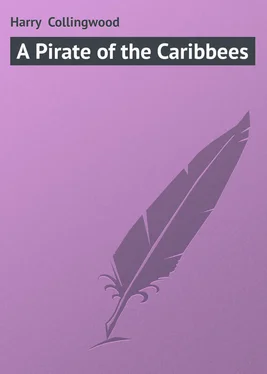Harry Collingwood - А Pirate of the Caribbees
Здесь есть возможность читать онлайн «Harry Collingwood - А Pirate of the Caribbees» — ознакомительный отрывок электронной книги совершенно бесплатно, а после прочтения отрывка купить полную версию. В некоторых случаях можно слушать аудио, скачать через торрент в формате fb2 и присутствует краткое содержание. Год выпуска: 0101, Жанр: foreign_antique, foreign_prose, на английском языке. Описание произведения, (предисловие) а так же отзывы посетителей доступны на портале библиотеки ЛибКат.
- Название:А Pirate of the Caribbees
- Автор:
- Жанр:
- Год:0101
- ISBN:нет данных
- Рейтинг книги:5 / 5. Голосов: 1
-
Избранное:Добавить в избранное
- Отзывы:
-
Ваша оценка:
- 100
- 1
- 2
- 3
- 4
- 5
А Pirate of the Caribbees: краткое содержание, описание и аннотация
Предлагаем к чтению аннотацию, описание, краткое содержание или предисловие (зависит от того, что написал сам автор книги «А Pirate of the Caribbees»). Если вы не нашли необходимую информацию о книге — напишите в комментариях, мы постараемся отыскать её.
А Pirate of the Caribbees — читать онлайн ознакомительный отрывок
Ниже представлен текст книги, разбитый по страницам. Система сохранения места последней прочитанной страницы, позволяет с удобством читать онлайн бесплатно книгу «А Pirate of the Caribbees», без необходимости каждый раз заново искать на чём Вы остановились. Поставьте закладку, и сможете в любой момент перейти на страницу, на которой закончили чтение.
Интервал:
Закладка:
When I awoke it was still breathlessly calm, and I thought for a moment that night had fallen, so dark was it; but upon consulting my watch I found that it still wanted nearly an hour to sunset. But, heavens! what a change had taken place in the aspect of the weather during the four hours or so that I had lain asleep in the stern-sheets of the boat! It is quite possible that, had I remained awake, I should scarcely have been aware of more than the mere fact that the sky was steadily assuming an increasingly sombre and threatening aspect; but, awaking as I did to the abrupt perception of the change that had been steadily working itself out during the previous four hours, it is not putting it too strongly to say that I was startled. For whereas my last conscious memory of the weather, before succumbing to the blandishments of the drowsy god, had been merely that of a lowering, overcast sky, that might portend anything, but probably meant no more than a sharp thunder-squall, I now awakened to the consciousness that the firmament above consisted of a vast curtain of frowning, murky, black-grey cloud, streaked or furrowed in a very remarkable manner from about east-south-east to west-nor’-west, the lower edges of the clouds presenting a curious frayed appearance, while the clouds themselves glowed here and there with patches of lurid, fiery red, as though each bore within its bosom a fiercely burning furnace, the ruddy light of which shone through in places. I had never before beheld a sky like it, but its aspect was sufficiently alarming to convince the veriest tyro in weather-lore that something quite out of the common was brewing; so I at once awoke the slumbering crew to inquire whether any of them could read the signs and tell me what we might expect.
The newly-awakened men yawned, stretched their arms above their heads, and dragged themselves stiffly up on the thwarts, gazing with looks of wonder and alarm at the portentous sky that hung above them.
“Well, if we was in the Chinese seas, I should say that a typhoon was goin’ to bust out shortly,” observed one of them—a grizzled, mahogany-visaged old salt, who had seen service all over the world. “But,” he continued, “they don’t have typhoons in the Atlantic, not as ever I’ve heard say.”
“No, they don’t have typhoons here, but they has hurricanes, which I take to mean pretty much the same thing,” remarked another.
“You are right, Tom,” said I, thus put upon the scent, as it were, “a Chinese typhoon and a West Indian hurricane are the same thing under different names. A third name for them is ‘cyclone’; and as this threatening sky seems to remind Dunn so powerfully of a Chinese typhoon, depend upon it we are going to have a taste of a West Indian hurricane, or cyclone. I have read somewhere that they frequently originate out here in the heart of the Atlantic.”
“If we’re agoin’ to have a typhoon, or a hurricane, or a cyclone—whichever you likes to call it—all I say is, ‘The Lord ha’ mercy upon us,’” remarked Dunn. “Big ships has all their work cut out to weather one o’ them gales; so what are we agoin’ to do in this here open boat, I’d like to know?”
“Have you ever been through a typhoon, Dunn?” I asked.
“Yes, sir, I have, and more than one of ’em,” was the reply. “I was caught in one off the Paracels, in the old Audacious frigate,—as fine a sea-boat as ever was launched,—and, in less time than it takes to tell of it, we was dismasted and hove down on our beam-ends; and it took us all our time to keep the hooker afloat and get her into Hong-Kong harbour. And the very next year I was catched again—in the Bashee Channel, this time—in the Lively schooner, of six guns. We knowed it was comin’; it gived us good warnin’ and left us plenty of time to get ready for it; so Mr Barker—the lieutenant in command—gived orders to send the yards and both topmasts down on deck, and rig in the jib-boom; and then he stripped her down to a close-reefed boom foresail. But we capsized—reg’larly ‘turned turtle’—when the gale struck us, and only five of us lived to tell the tale. As to this here boat, if a hurricane anything at all like them Chinee typhoons gets hold of her, why, we shall just be blowed clean away out o’ water and up among the clouds! And that’s just what’s goin’ to happen, if signs counts for anything.”
Wherewith the speaker thrust both hands into his trouser pockets, disgustedly spat a small ocean of tobacco-juice overboard, and subsided into gloomy silence.
It was a sufficiently alarming retrospect, in all conscience, to which we had just listened, and the prophetic utterance wherewith it had been wound up, while powerfully suggestive of a highly novel and picturesque experience in store for us, was certainly not attractive enough to cause us to look forward to its fulfilment with undisturbed serenity; nevertheless, I did not feel like tamely giving in without making some effort to save the boat and the lives with which I had been entrusted, so I set myself seriously to consider how we could best utilise such time as might be allowed us, in making some sort of preparation to meet the now confidently-expected outburst. I looked over our resources, and found that they consisted, in the main, of eight oars, two boat-hooks, two masts, two yards, three sails, half a coil of two-inch rope that some thoughtful individual had pitched into the boat when getting her ready for launching, half a coil of ratline and two large balls of spun-yarn, due to the forethought of the same or some other individual, a painter some ten fathoms long, and the boat’s anchor, together with the gratings, stretchers, and other fittings belonging to the boat, and a few oddments that might or might not prove useful.
Was it possible to do anything with these? After considering the matter carefully I thought it was. The greatest danger to which we were likely to be exposed seemed to me to consist in our being swamped by the flying spindrift and scud-water or by the breaking seas, and if we could by any means contrive to keep the water out there was perhaps a bare chance that we might be able to weather the gale. And, after a little further consideration, I thought that what I desired to do might possibly be accomplished by means of the boat’s sails, which were practically new, and made of very light, but closely woven canvas, that ought to prove water-tight. So, having unfolded my ideas to the men, we all went to work with alacrity to put them to the test of actual practice.
Of course it was utterly useless to think of scudding before the gale; our only hope of living through what was impending depended upon our ability to keep the boat riding bows-on to the sea, and to do this it became necessary for us to improvise a sea anchor again. This was easily done by lashing together six of our eight oars in a bundle, three of the blades at one end and three at the other, with the boat anchor lashed amidships to sink the oars somewhat in the water and give them a grip of it. A span, made by doubling a suitable length of our two-inch rope, was bent on to the whole affair, and the boat’s painter was then bent on to the span, when the apparatus was launched overboard, and our sea anchor was ready for service.
Our next task was to cut the two lug-sails adrift from their yards. The mainsail was then doubled in half, and one end spread over the fore turtle-back and drawn taut. Over this, outside the boat and under her keel, we then passed a length of our two-inch rope, girding the boat with it and confining the fore end of the sail to the turtle-back, when, with the aid of one of the stretchers, we were able to heave this girth-rope so taut as to render it impossible for the sail to blow away. But before heaving it taut, we passed a second girth-rope round the boat over the after turtle-back, next connecting both girth-ropes together by lengths of rope running fore and aft along the outside of the boat underneath the edge of the top strake. The doubled mainsail was then strained taut across the boat, and its edges tucked underneath the fore-and-aft lines outside the boat; the foresail was treated in the same way, but with its fore edge overlapped by about a foot of the after edge of the mainsail. Our girth-ropes were then hove taut, with the finished result that we had a canvas deck covering the boat from the fore turtle-back to within about six feet of the after one. The edges of the sails were next turned up and secured by seizings on either side, and our deck was complete. But, as it then stood, I was not satisfied with it, for at the after extremity of it there was an opening some six feet long, and as wide as the boat, through which a very considerable quantity of water might enter—quite enough, indeed, to swamp the boat. And with our canvas deck lying flat, as it then was, there was no doubt that very large quantities of water would wash over it, and pour down through the opening, should the sea run heavily. Our deck needed to be sloped upward from the forward to the after end of the boat, so that any water which might break over it would flow off on either side before reaching the opening to which I have referred. We accordingly laid the boat’s mainmast along the thwarts fore and aft, amidships, and lashed the heel firmly to the middle of the foremost thwart. Then, by lashing our two longest stretchers together, we made a crutch for the head or after end of the mast to rest in; when, by placing this crutch upright in the stern-sheets against the back-board, we were able to raise the mast underneath the sails until it not only formed a sort of ridge-pole, converting the sails into a sloping roof, but it also strained the canvas as tight as a drum-head, rendering it so much the less liable to blow away, while it at the same time afforded a smooth surface for the water to pour off, and it also possessed the further advantage that it gave us a little more headroom underneath the canvas deck or roof. This completed our preparations—none too soon, for it was now rapidly growing dark, and the light of our lantern was needed while putting the finishing touches to our work.
Читать дальшеИнтервал:
Закладка:
Похожие книги на «А Pirate of the Caribbees»
Представляем Вашему вниманию похожие книги на «А Pirate of the Caribbees» списком для выбора. Мы отобрали схожую по названию и смыслу литературу в надежде предоставить читателям больше вариантов отыскать новые, интересные, ещё непрочитанные произведения.
Обсуждение, отзывы о книге «А Pirate of the Caribbees» и просто собственные мнения читателей. Оставьте ваши комментарии, напишите, что Вы думаете о произведении, его смысле или главных героях. Укажите что конкретно понравилось, а что нет, и почему Вы так считаете.











